The Role of HSE Professionals
in the Workplace
The Role of HSE Professionals in the Workplace
Introduction
Workplace
safety is a critical aspect of any organization. A safe working environment
promotes productivity, reduces accidents and injuries, and protects the
well-being of employees. HSE (Health, Safety, and Environment) professionals
play an essential role in ensuring workplace safety. They are responsible for
developing and implementing safety policies and procedures, conducting safety
audits, and training employees on safety practices. This article will explore
the role of HSE professionals in the workplace and how they contribute to the overall
safety and well-being of employees.
The Role of HSE Professionals in the Workplace
HSE
professionals play a critical role in promoting workplace safety. Their primary
responsibility is to ensure that the workplace is free from hazards that may
cause harm or injury to employees. They are responsible for identifying
potential hazards and developing strategies to prevent accidents and injuries.
HSE professionals work in a variety of industries, including manufacturing,
construction, healthcare, and hospitality.
Developing Safety Policies and Procedures
One
of the primary responsibilities of HSE professionals is to develop safety
policies and procedures. These policies and procedures outline the steps that
employees must take to ensure their safety while working. They also outline the
responsibilities of the employer in maintaining a safe working environment. HSE
professionals work with management and other stakeholders to develop these
policies and procedures, ensuring that they comply with local, state, and
federal safety regulations.
Conducting Safety Audits
Another
critical responsibility of HSE professionals is to conduct safety audits.
Safety audits involve inspecting the workplace to identify potential hazards
and risks. These audits may be conducted on a regular basis or in response to a
specific incident. HSE professionals use their expertise to identify potential
hazards and develop strategies to address them. They may recommend changes to
equipment or processes to reduce the risk of accidents or injuries.
Training Employees on Safety Practices
HSE
professionals are responsible for training employees on safety practices. They
develop and deliver training programs to educate employees on safe work
practices and procedures. These training programs may cover a range of topics,
including how to use equipment safely, how to handle hazardous materials, and
how to respond to emergency situations. HSE professionals may also conduct
refresher training sessions to ensure that employees maintain their knowledge
of safety practices.
Investigating Accidents and Incidents
HSE
professionals are responsible for investigating accidents and incidents that
occur in the workplace. They analyze the causes of accidents and incidents and
make recommendations to prevent similar events from happening in the future.
HSE professionals work with management and employees to identify ways to
improve workplace safety and prevent accidents and injuries.
Ensuring Compliance with Safety Regulations
HSE
professionals are responsible for ensuring that their organization complies
with local, state, and federal safety regulations. They stay up-to-date on
changes to safety regulations and ensure that their organization is in
compliance with these regulations. HSE professionals may work with regulatory
agencies to ensure that their organization meets all safety requirements.
The Importance of HSE Professionals
Employers
have a legal and ethical responsibility to provide a safe working environment
for their employees. HSE professionals play a critical role in fulfilling this
responsibility by identifying potential hazards, developing safety policies and
procedures, and training employees on safe work practices. By prioritizing
workplace safety, employers can prevent accidents and injuries, reduce workers'
compensation claims, and avoid legal liability. HSE professionals can help
organizations meet these goals by implementing effective safety programs and
promoting a culture of safety in the workplace.
Skills and Qualifications of HSE Professionals
HSE
professionals come from a variety of educational backgrounds, including health
and safety, engineering, and environmental science. In addition to education,
HSE professionals must possess strong communication, problem-solving, and
critical thinking skills. They must be able to work effectively with employees
at all levels of the organization and have a thorough understanding of local,
state, and federal safety regulations. Many HSE professionals also hold
certifications in safety management, such as the Certified Safety Professional
(CSP) or Occupational Health and Safety Technologist (OHST) certifications.
FREE - MANUAL HANDLING TRAINING MODULE
Challenges Facing HSE Professionals
HSE
professionals face a range of challenges in promoting workplace safety. One of
the biggest challenges is engaging employees in safety initiatives. Employees
may not always see the value in safety programs or may be resistant to change.
HSE professionals must be able to communicate the importance of workplace
safety and engage employees in safety initiatives. Additionally, HSE
professionals must stay up-to-date on changes to safety regulations and adapt
their programs accordingly. Finally, HSE professionals may face budgetary
constraints or other organizational barriers that make it difficult to
implement effective safety programs.
Conclusion
HSE
professionals play a critical role in promoting workplace safety. They are
responsible for developing and implementing safety policies and procedures,
conducting safety audits, training employees on safety practices, investigating
accidents and incidents, and ensuring compliance with safety regulations. HSE
professionals work in a variety of industries and play a vital role in
protecting the well-being of employees. Organizations that prioritize workplace
safety and employ HSE professionals are more likely to have a productive and
healthy workforce.
Part 2 Electrical Safety Pictorial Guidelines





No comments:
Post a Comment